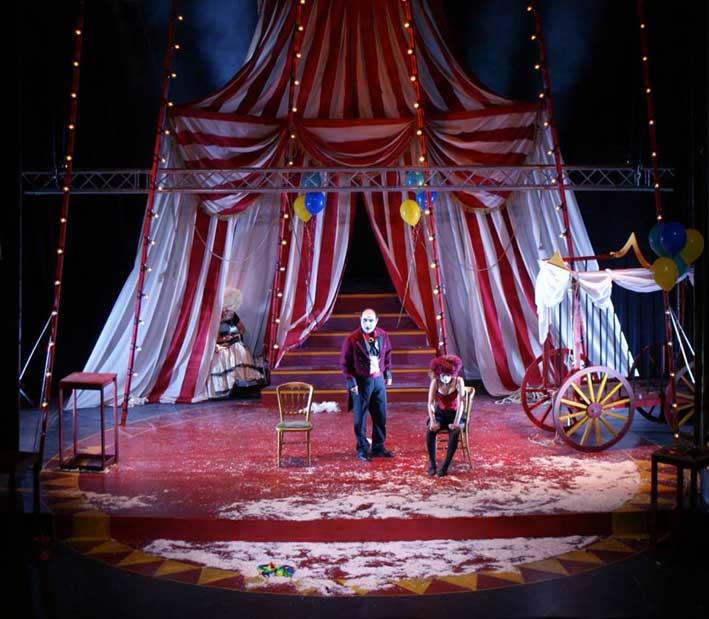Recently, in Teatru Manoel was presented a play Antigone. Based on Jean Anouilh's version, this new production of Sophocles' Classical Greek play is a collaboration between Teatru Manoel, Sharon Bezzina and Tyrone Grima who was also the director of the production.
Set in a Victorian circus the play centres on the main character, Antigone, who, as in the original play, is willing to disobey the law in order to bury her brother Polynices, defy the authority of her uncle Creon and is willing to sacrifice her life, if necessary.

First, you notice that the choir is replaced by a showman who quickly introduces the main characters of the play and narrates the background leaving us with the scene where the nurse discovers Antigone sneaking back to her room early in the morning. I have to admit, the showman was the most believable character in the entire play. His voice, posture and body movements corresponded with the text. However, guiding the audience through the main points of the plot he managed to stop there, where it seemed unnecessary and emphasised what, from the side, sounded completely redundant.
In addition, it is not a secret that to play a character like Antigone requires an incredible spiritual strength. Not only one's voice but the posture has to declare the decision to bury her brother despite all consequences. Although, in the production of Teatru Manoel you find the main character concerned more about her fiancée, Haemon, then, what should be the cornerstone of the play. Later on, it doesn't really matter how hard Creon tries to push Antigone towards the context of the original play, we are already distracted from it by the chitchat, at the beginning of the play, between Antigone and the nurse. No matter how hard Antigone attempts to show her emotions by scattering chess pieces on the floor or screaming Cock into Creon's face, she fails to bring us back into the play. Further, it felt like the characters are dressed up to be the shadows of those from the original play; it felt that the plot for this play was written with a trembling hand and, although, the production clearly took some creative risks by wrapping the play into the Victorian circus theme, the lack of connection makes it a bad joke instead of an interesting experiment.

Undoubtedly, to set up the plot, written by Jean Anouilh, in the Victorian circus is by itself a challenge! The director has to connect ancient Greek elements with the theme of the Victorian circus. Unfortunately, in some places it doesn't work out because the elements like balloons or juggling balls don't have in itself the symbolic strength to transmit the message of Antigone or Creon. It works more as another distraction. Especially, when you have to listen for an important monologue or dialogue.
In the same way, the music is not always capturing and supporting the mood that the characters are trying so hard to build. The music doesn't create an impression that you are in a circus, nor in Ancient Greece. The only place which comes into my mind to describe the feeling is limbo. A place of uncertainty.
Nonetheless, the costumes and the make-up of the characters were something to cherish about. They were those hints that gave a clue to the spectator who came to see the play without reading a brochure. Regardless, you have to come prepared and have a common knowledge about the original play and the production of Jean Anouilh's version; otherwise, you will be very easily misguided and trapped into non ending yawns.
Finally, when the fate of Antigone is clear a fragile female's voice spreads through the theatre as a condolence to the tragic end that waits for her. Soon, it is completed and the corpses of Antigone and Haemon lie on the stage. Eurydice, the wife of Creon, who was sitting the entire play suddenly rises. A few moments are given to her. She has a task to transmit the feeling of a mother who has just lost a son. Next, the scream accompanied by the blinding circus lights and then Eurydice dies, clasping back into the same chair.
At the end, instead of condemning himself Creon goes on with his required duties while the guards continue playing cards. Not even a tear.
On the whole, the play left a bitter taste in the mouth. It seemed that the main points and accents were thrown out to a garbage bin. Maybe it is not a bad thing that it only lasted for three days. You could tell that the spectators weren't amazed as well. None of them applauded standing up. Another interesting thing to consider is that only one third of the theatre was occupied. It is quite a small number when you think that this is a premiere. I hope that the shows on Saturday and Sunday were more successful.
At the end, it was an attempt and in Malta there is a desperate need for these types of attempts, especially, when Valletta is the capital of Europe for 2018. When is there a better time to start a reconstruction in theatre culture if not now? To dare producing classical plays and their reproductions, to dare challenging the public and provoking them by pushing to the edge of the seat!